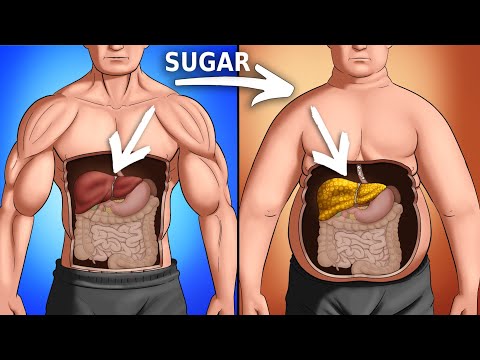After 30 days without sugar, what happens to your body?

After 30 days without sugar, what happens to your body?
What Happens to Your Body When You Remove Sugar from Your Diet for 30 Days?
Sugar, in its many forms, has become a ubiquitous part of our daily diets. From the obvious sugary treats like candies, cakes, and sodas to the hidden sugars in processed foods, it’s hard to escape its presence. But what would happen if you decided to cut sugar out of your diet entirely for 30 days? Here’s a breakdown of how your body might respond during this sugar detox.
Week 1: The Withdrawal Phase
When you first remove sugar from your diet, your body may go through what’s known as “sugar withdrawal.” This is because sugar can activate the pleasure centers of your brain, causing the release of dopamine (the “feel-good” hormone). As a result, you may experience symptoms similar to withdrawal from other addictive substances. These can include:
- Cravings: Sugar is highly addictive. When you eliminate it, your body will likely crave the rush of energy it used to get from sugar. You might find yourself wanting something sweet, even after meals.
- Fatigue and Irritability: Without sugar, your blood sugar levels may fluctuate. This can lead to feelings of fatigue, irritability, or even anxiety as your body adjusts to functioning without quick glucose sources.
- Headaches: Low blood sugar levels can cause headaches, and these are common in the first few days of cutting sugar from your diet.
It’s important to remember that these symptoms are temporary. As your body starts to adjust, the cravings and irritability will decrease, and you’ll begin to feel better.

Week 2: Stabilization and Energy Boost
By the second week of a sugar-free lifestyle, the initial withdrawal symptoms should subside. Your body begins to find other sources of energy. Without the quick fix of sugar, your body starts to rely more on complex carbohydrates, healthy fats, and proteins to stabilize blood sugar levels.
Some noticeable changes might include:
- Improved Energy Levels: Once the body has adjusted, you’ll likely start to experience more stable energy throughout the day. Unlike sugar, which can cause a spike in energy followed by a crash, whole foods release energy more gradually. This means you won’t experience the mid-afternoon slumps.
- Better Sleep: Without sugar, your blood sugar won’t be spiking and crashing at night, which often disrupts sleep patterns. Many people find that they start sleeping more soundly and waking up feeling more refreshed.
- Improved Digestion: Sugar can contribute to bloating and gastrointestinal issues. Without it, your digestive system might start to function more smoothly, and you may notice less bloating or discomfort after meals.
Week 3: Mental Clarity and Mood Stabilization
As you continue your 30-day journey without sugar, you’ll start to experience mental clarity and mood stabilization. Sugar has a profound effect on the brain, often leading to mood swings and irritability. Here’s what’s likely to happen:
- Mental Clarity: The foggy brain that many people experience after consuming sugar will start to lift. You’ll likely find it easier to focus and concentrate, and your memory may even improve.
- Better Mood: The mood swings often associated with blood sugar highs and lows should begin to stabilize. Without sugar’s ups and downs, your mood becomes more stable. You may even feel a greater sense of well-being.
- Reduced Inflammation: Sugar can promote inflammation in the body, which is linked to a variety of conditions like arthritis and skin issues. With reduced sugar intake, the body begins to heal from this inflammation, and your skin may clear up, reducing acne or redness.
Week 4: Long-Term Health Benefits
As you enter the fourth week of your sugar-free experiment, you’ll likely start noticing longer-term health benefits. Here’s what you might experience:
- Weight Loss: Cutting out sugar is often accompanied by weight loss. This is because sugar, especially refined sugar, contributes to excess calorie consumption without providing any nutritional value. When you cut it out, you may reduce overall caloric intake, leading to gradual weight loss. Additionally, your body might burn fat more effectively as your insulin levels stabilize.
- Lowered Risk of Chronic Diseases: A diet high in sugar is linked to an increased risk of chronic diseases like type 2 diabetes, heart disease, and fatty liver disease. By eliminating sugar for 30 days, you’re giving your body a chance to reduce insulin resistance and lower inflammation, both of which are risk factors for these conditions.
- Improved Skin: Many people report clearer skin after reducing sugar. This is likely due to the reduction in inflammation, as well as lower levels of insulin and blood sugar, which can contribute to acne.
- Improved Gut Health: Sugar can negatively impact the balance of bacteria in your gut, potentially leading to bloating and other digestive issues. By removing sugar, you may see improvements in gut health, including less bloating, gas, and discomfort.

The Bottom Line: Is It Worth It?
The benefits of cutting sugar from your diet for 30 days are substantial, ranging from weight loss and better energy to improved mental clarity and a reduction in inflammation. While the first few days may be challenging due to withdrawal symptoms, the longer you go without sugar, the more you’ll likely enjoy a more stable mood, clearer skin, and a healthier body overall.
That said, it’s important to remember that not all sugar is created equal. Naturally occurring sugars in fruits, vegetables, and whole grains come with beneficial fiber and nutrients, unlike the refined sugars found in processed foods. If you want to make lasting changes, the key is moderation and focusing on whole, nutrient-dense foods.
So, whether you plan to cut sugar for a full 30 days or just reduce your intake, your body will thank you for it—both in the short and long term.









